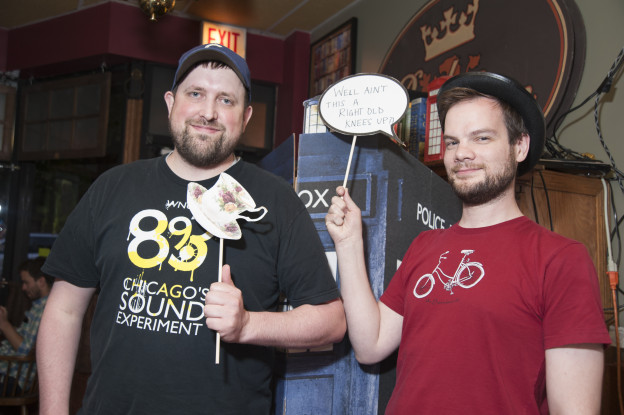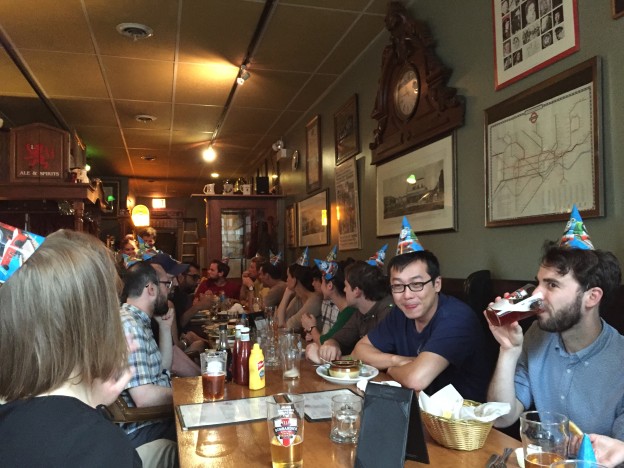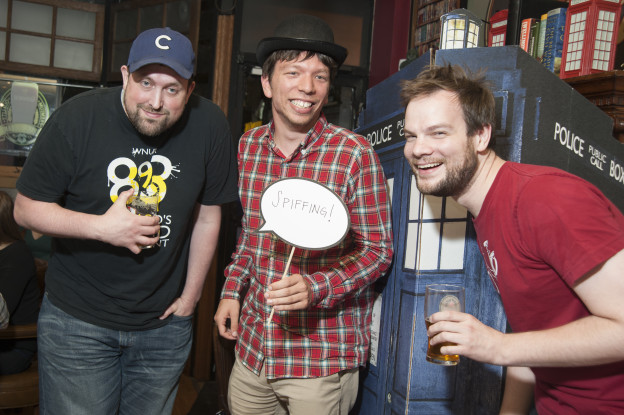After two wonderful weeks in the UK, I’m back in Chicago and ready to shower this blog in photos and happy memories. For the first half of the trip, I worked from the London office while Randi gallivanted around the city during the day and took a trip to Paris with Tash. But we still crammed in a lot, starting almost immediately with the Heath…

Hampstead Heath
Yes, within hours of passing through Heathrow’s pleasingly-efficient biometric passport gates, I was stomping around Hampstead Heath to sate months of longing for a swim in the mixed pond. It was quite a hunt, but the moment we splashed into the water was totally worth it. Joined by the wonderful Abbi, we dried off in the sole summery day of the week with a pitcher of Pimm’s and the first of many pub meals. Bangers and mash: job done.

Public service green screen
The next morning, we kicked off our tour of Dominic-approved British institutions by visiting BBC Broadcasting House. Having fallen in love with W1A earlier in the year, Randi (this blog’s Director of Better) was also excited to stalk any room with the slightest connection to Just A Minute. I highly approve. As you can see, we also had a go at reading the news, during which I spoke the vast majority of words on the autocue in the correct order.
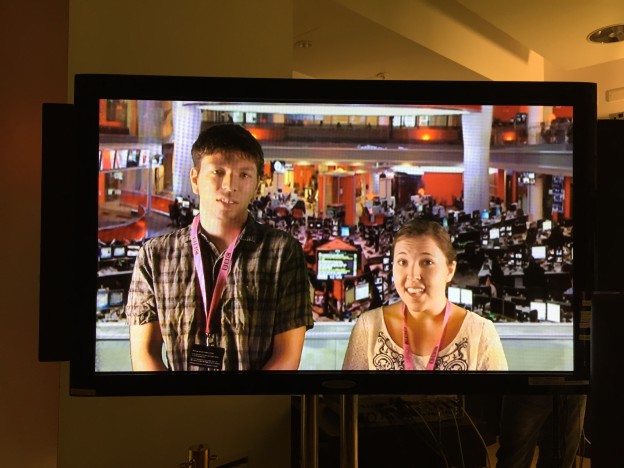
‘Fact’ times ‘Importance’ equals NEWS
On Thursday night, Randi’s friend Maisie joined us and Matt, Laura and the (now engaged!) Caroline and Charles for a traditional night of wine, politics and unflattering photos. (At least of me.) Happily, the brashly well-connected and snappily-dressed members of the group had arrived first and marched right into a private room… I certainly wasn’t complaining.

I don’t think I can caption this group ‘Themes & Sources’ anymore
The following night, a large group of us descended on NewsRevue – well I was hardly going to miss this, was I? – which was its usual excellent self. And also about 90% dedicated to the Labour leadership race, which I’d like to think of as Randi’s pay-off for taking in so much useless trivia about British politics. (Fear not, they also included Donald Trump’s rendition of America Fuck Yeah. It was great.)
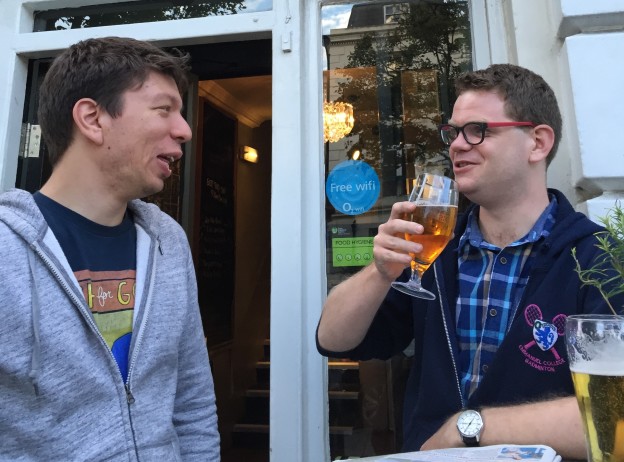
Simon offers to show me his Jeremy Corbyn tattoo

Joshua! Simon! More drinks than seems necessary!
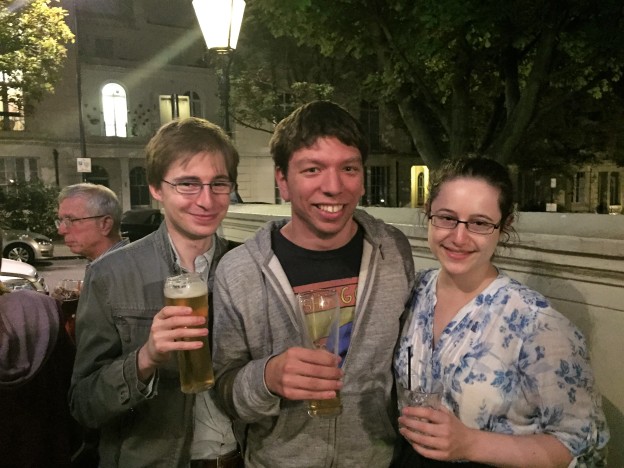
Besties
With so much politics, it was only right that we toured Parliament – that absurd Victorian Gothic palace which still gives me thrills of excitement to walk through. You can peer over the balconies of as many staid state and federal legislatures as you want, and they are impressive in their own way, but nothing comes close to the combat fields of the green benches in the House of Commons.

Definitely London
But there are other British traditions which are equally important, and one of them is the cheerful determination to continue a back garden barbecue through the drizzle of a Bank Holiday weekend. So a million thanks to Cat and Matt for sharing this experience, and letting us crash at their new flat after celebrating Cat’s birthday with many fine people (Groupon and non-Groupon alike) at a nearby Leytonstone pub. Not pictured below are Biff and Christa, but rest assured they also made it!

Sheltering with Marielle and Emily

So perfectly English

The morning after, with Cat and Matt
So far this all sounds like a hurried clip-show from the last few years of my life in London, but I also got to try a totally new experience for me: Time Run, an escape-the-room style adventure. Katie, Randi and I were pitted against a team of Regans in an immersive time-travelling game which was SO MUCH FUN. And probably the closest I will ever come to becoming a Doctor Who companion, especially as we kinda failed the prospective companion test by not succeeding in our ultimate quest. But we did solve a whole bunch of puzzles along the way in three exquisitely designed sets, and I recommend booking yourself a Time Run unreservedly.
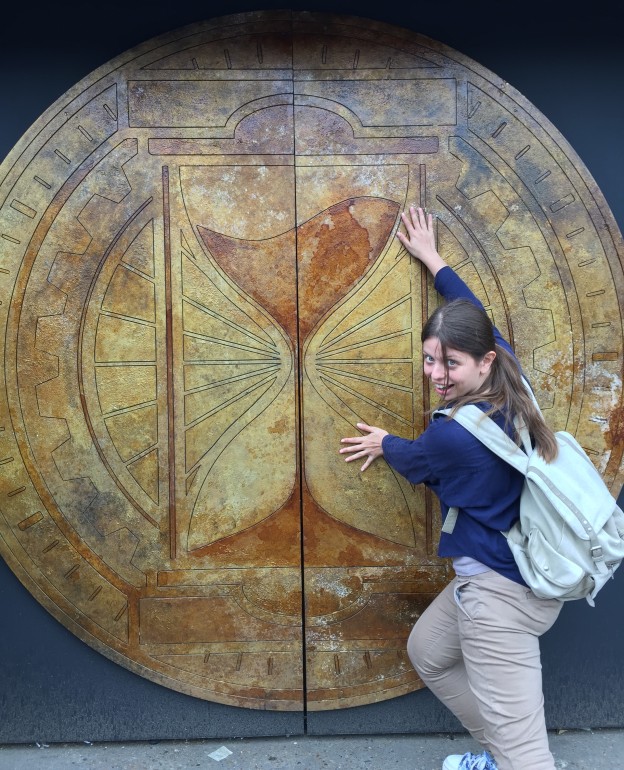
Katie’s eager to get started on our time-travelling quest
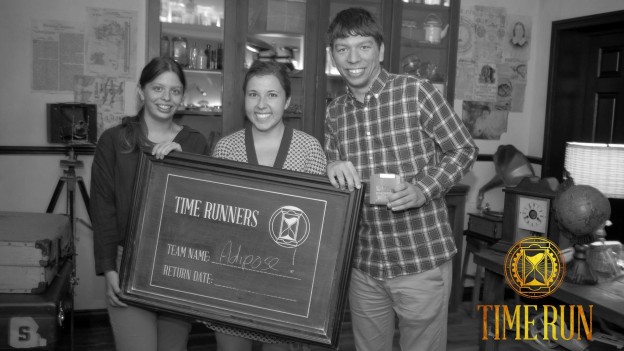
Team Adipose
The other side to the week, of course, was just spending time with my family again. It never feels like enough time, but my mum was generous enough to throw an afternoon tea for the whole extended family in one go, so at least I got to see (almost) everyone. And for all of the running around, one of my favourite memories from this trip will just be sitting alone with my dad, in a darkened room, drinking Old Speckled Hen and listening to Doctor Who soundtracks and other pieces of music we share. It was good to be home.
Set the clocks to BST, crack open a packet of digestive biscuits and start putting the letter U back into words where it belongs: I’m visiting home again!
Randi and I are flying to London tomorrow evening, which is inordinately exciting, because even the simplest things will make me happy. Like a toffee yoghurt. I haven’t had a toffee yoghurt in over a year, and that’s not cool. Before we leave, though, a few Chicago things:
- It was Katie’s last week at work – a seriously sad development, tempered by envy/admiration/longing for her move to New York. (New York! Almost as good as London!) Her farewell party was at Parrots, which I hope I can call a ‘dive bar’ while conveying great affection. Was great to see a bunch of people – Katie has always been great at bringing well-matched friends together – including Aaron from Groupon days gone by. We’ll miss you, Katie 😎
- Our second Common Room play this month: Loving Repeating, a musical based on the life of Gertrude Stein and her relationship with Alice B. Toklas. I had zero idea who Gertrude Stein was, but brushed up in advance (American, lived in Paris, collected art, wrote, didn’t like commas) and enjoyed the production. I mean, it wasn’t my normal arena of interest, but they did a good job incorporating what was distinctive about Stein’s written style into the fabric of the music itself. Also, someone at Common Room tipped us all off that cows = orgasms, and it’s damned helpful to have metaphors pointed out in advance. (I mean that entirely sincerely.)
- We failed to go mini golfing with Todd and Carolyn. In fairness, it was approximately eight thousand degrees outside. So we stayed in and ate pizza and played Fibbage instead. Fair?
- We did manage to go drinking with Ellen and Kannan, swapping our favourite podcasts and evangelising Kindles. We are cool beyond measure.
- We also managed to go bowling
in the 1940sat The Fireside Bowl:

Randi, me, Robert, Marti, Luis and an anti-Soviet missile launching terminal
After a summer hiatus, Common Room is back! If you’re in Chicago, cancel everything else and come along to the next one. If you’re lucky, you’ll even get pulled on stage for the traditional ‘interview with an audience member’ segment, as Randi’s friend Rachel discovered last week.
We also introduced her to the perpetual comedy motion machine which is Improv Shakespeare at the iO. Night of the Living Bed – the fourth production I’ve seen – was as rip-roaringly brilliant as ever and contained a commendable sequence of single-payer healthcare system puns. (Which is more than can be said of the first Republican primary debate… although if you listened closely, you could just about hear Donald Trump praising Scotland’s NHS, which was somewhat surreal.)
Sadly, after his final show on Thursday, Jon Stewart is no longer around to make all that nonsense feel better. A logical alternative is to turn to drink, which we greatly enjoyed with Lauri on Friday night. And on Saturday, AJ (of the ‘British, newly arrived in Chicago’ variety) joined us for Fabulation, or The Re-Education of Undine. Having decided to buy tickets after seeing a few scenes at Common Room, it grew increasingly familiar until I finally searched my own brain blog and confirmed that, yes, I actually first saw this play at the Tricycle back in 2006 on a school trip. With great consideration I had avoided spoiling the plot for my future self, a courtesy I will now repeat in case this happens once again, but for the record it’s certainly a very funny and enjoyable play.
Finally, two more authentic experiences I can now check off:
- Being turned away from urgent care because of the ‘wrong’ insurance (not for me – and yes, everyone’s OK)
- Having a debit card cloned and used for fraudulent purchases at McDonald’s (and yes, I got all the money back and everything’s OK)
If Katie hadn’t visited, I’d blog about a few things:

Ingrid Michaelson at the Chicago Theatre
- Wine tasting and a major sand dune-based construction stimulus package in Michigan
- Ramya leaving for Palo Alto; Anthony seeing her off with Malört
- Gathering on picnic blankets in Millennium Park for an open-air and alcohol-friendly screening of Back to the Future. (It frustrates me that Marty grants himself a mere ten minutes at the end to try and prevent Doc’s death. I leave more buffer time to catch a train.)
- Seeing Ingrid Michaelson act all kooky but lovable in concert at the Chicago Theatre. For some reason that I made up in my head that she and Sara Bareilles were both Australian. For the record, they are not.
- Curating a ‘Trashy British TV Night’ for Catherine and Jason. The British Council should probably be paying me. (No likey? No lighty!)
But Katie did visit, so let’s skip straight to that instead:

Kayaking down the Chicago River!

Saddened by the age restrictions at Maggie Daley Park (not a joke)

Waiting outside Kuma’s Corner

The nicest Chicago-style pizza I’ve had so far at Lou Malnati’s

With a retired ex-raver pig on the roof
In addition, we (finally!) visited the Field Museum, drunk strictly non-alcoholic cocktails at the top of the Hancock Centre, enjoyed a cheeky Nando’s at their newly opened Chicago location, played an exhausting game of Munchkin against Jatherine, admired Lincoln (who doesn’t?) and continued to funnel lots of breakfast money into Windy City Café. And special mention to the Urban Kayaks tour – it’s a wonderful way to see the city afresh, and highly recommended.
I think I’ve had more than my fair share in life, but I still love surprise birthdy parties 🙂
Thank you so much to everyone who came: Billy, Taylor, Agata, Emilie, Ellen, Robert, Julie, Shelby, Benno, Calvin, Nolan, Chrissy, Brandon, Carolyn, Theron, Catherine, Jason, Ramya, Abhishek, Karol, Kevin, Corey and ESPECIALLY to:
- Todd, who organised a British-themed trivia quiz (which my team thankfully won else I’d never hear the end of it)
- Katie, who baked cakes and took photos and decorated and is generally awesome
- Randi, who masterminded the whole thing and is (a) untrustworthy (b) amazing ❤
And also to my sisters who contributed British phrases in advance! (Did you know that “lost the plot” is not part of American English? That’s a real loss.) I love all of the above.
Turning 26 means I’ve been living in Chicago for a little over a year, and I am still blown away by the warmth and generosity of the people in my life here. It’s sad that immigration is never seen in these terms back at home. Instead it’s all migration statistics, spurious debates about welfare and tough talk about border controls. If we spent a fraction of the time celebrating instead what it takes to make people feel welcome, we’d be a happier people.





